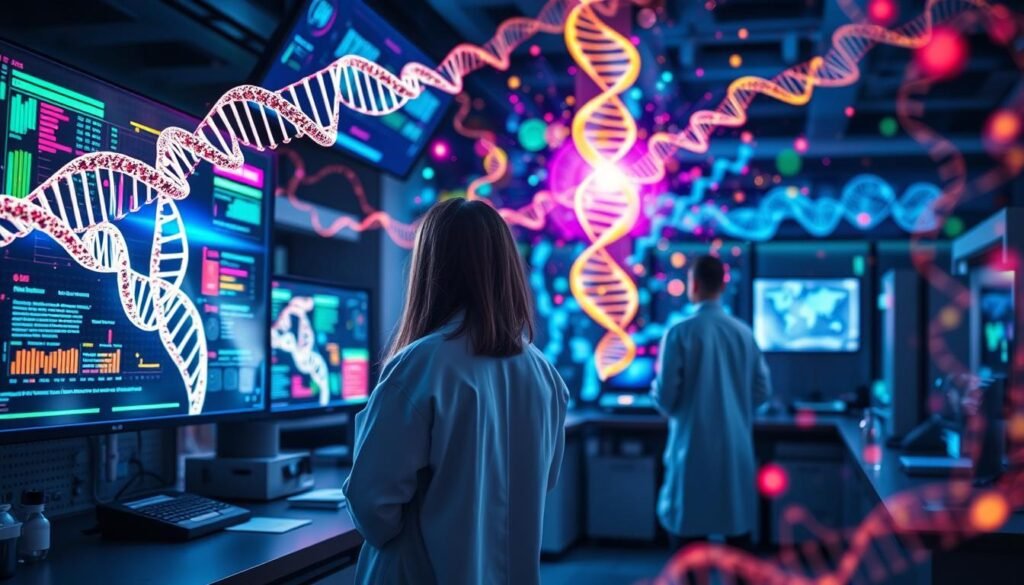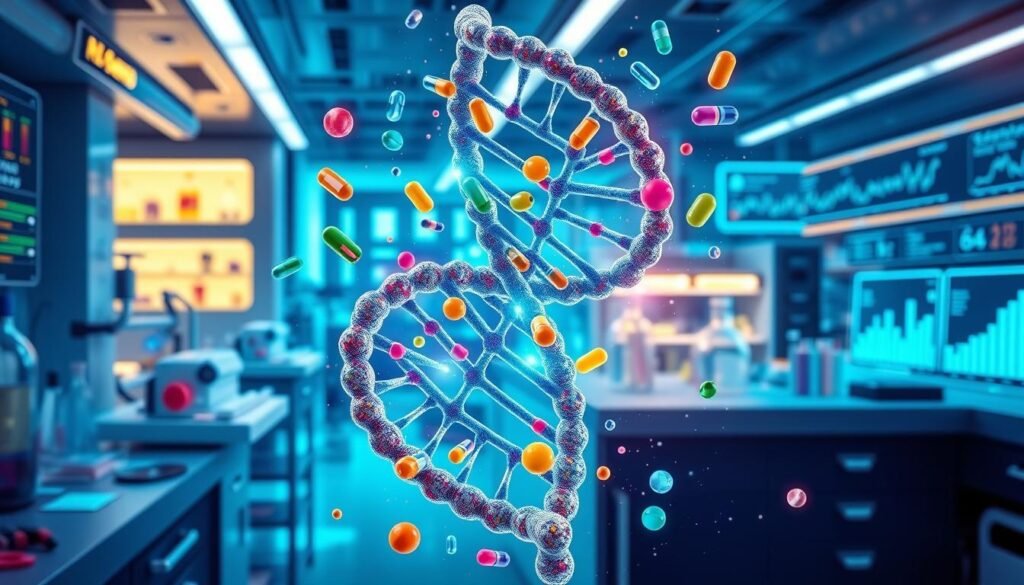Did you know treatments customized to genetic resistance can succeed 84% of the time? This amazing fact shows how precision medicine can change healthcare. It customizes care based on our genes, where we live, and how we live. The end of the Human Genome Project has started a new healthcare era. It moves away from one-size-fits-all treatments to more personal care based on genetic knowledge.
Medicine is changing, with treatments based on genetic markers and mutations leading the way. This change is aiming for better outcomes for patients. By using genetic tests in treatment plans, doctors can better tackle diseases. This approach makes treatments more effective. This part talks about how important these changes are in medicine. It shows how precision medicine is changing healthcare delivery.
Key Takeaways
- Precision medicine personalizes healthcare by analyzing individual genetic information.
- 84% eradication success can be achieved when treatments are aligned with genetic markers.
- The Human Genome Project is foundational in the shift towards personalized therapy.
- Tailoring treatments can significantly enhance the effectiveness of medical interventions.
- Genetic testing plays a critical role in understanding disease susceptibility and treatment response.
Understanding Precision Medicine
Precision medicine is a cutting-edge approach in healthcare. It aims to provide customized treatment plans for each patient. This method looks at a person’s genes, environment, and lifestyle.
The idea of precision medicine has been advancing. It has become more popular as the importance of genetic information grows. Diseases are not just classified by type but by genetic differences. This helps doctors create better, more specific treatments.
With more people living longer, chronic diseases are becoming more common. Precision medicine is a beacon of hope. It promises to change how we treat and prevent diseases that often lead to death.
Genetic tests help doctors find out who might get certain diseases. This way, they can catch diseases early and treat them in a personalized way. This approach is improving how well treatments work and overall health outcomes.
| Aspect | Description |
|---|---|
| Definition | An emerging approach customizes treatments based on individual differences. |
| Focus Areas | Genetic variances, environmental factors, and lifestyle choices of patients. |
| Applications | Effective treatment directions for cancers, cardiovascular diseases, and other complex conditions. |
| Benefits | Enhanced treatment personalization and efficiency, leading to better patient outcomes. |
The Rise of Tailored Treatments
Healthcare has changed a lot. It moved from one-size-fits-all to more personal treatments. Thanks to new discoveries in genetics, doctors can look at the exact mutations in tumors. This means treatments are more specific and not just guesswork. This change is all about using genetic tests to improve how well treatments work for each person.
Pharmacogenomics is a big part of this change. It’s about knowing how a person’s genes affect their reaction to drugs. This helps avoid bad reactions to medicines and makes treatments work better. It’s key to use this genetic knowledge in regular medical care.
However, there are challenges. Making these personalized treatments can be expensive. This can make it hard for everyone to get them, increasing healthcare gaps. But, drug companies are working on this. They’re using biomarkers to make drugs that match certain genes. This saves time in testing and might help more people.
Technology and big data are also helping a lot. They let doctors closely look at patients’ information. This helps make treatment plans that are very precise. It’s a step towards treatments that truly fit the individual, leading to better health.
Bringing personalized medicine into everyday care is a big deal. It’s changing healthcare by considering our genes, how we live, and where we are. This progress is exciting and aims to make care better for everyone in many parts of healthcare.
Want to know more about how genes affect health? Check out this in-depth resource.
Genomic Profiling: Key to Personalized Therapy
Genomic profiling is a big step forward in personalized therapy. It focuses on studying a person’s DNA to design specific treatment plans. By looking at genetic markers, doctors can understand the unique mutations in a patient’s genes. This is vital because 20–75% of patients might not react to common medicines. With more than 500 genomic areas linked to disease risk, genomic profiling’s role is crystal clear.
Mutation analysis is a key technique in genomic profiling. It helps find changes in DNA called single nucleotide polymorphisms (SNPs), which make up 90% of DNA variations. Most genetic differences are found within these SNPs, making them important for spotting therapeutic targets. By understanding these changes, doctors can use targeted therapies. These therapies focus on the genetic roots of diseases rather than just the symptoms.
The technologies from the Human Genome Project help make this profiling possible. They let scientists explore genetic variations. For example, they’ve found mutations in genes like KRAS and TP53, which are common in cancer types such as pancreatic cancer. These mutations make treating the cancer more complex. Targeted therapies, using specific molecular markers to stop cancer growth, benefit greatly from genomic profiling.
| Genetic Variations | Impact on Health | Treatment Strategies |
|---|---|---|
| SNPs | Most common form of genetic variation | Targeted therapies based on specific SNP identification |
| Copy Number Variants (CNVs) | Involves larger segments of DNA; can indicate disease risk | May guide treatment modifications based on CNV presence |
| Mutations in cancer-related genes | Link to aggressive cancer types such as pancreatic cancer | Tailored therapies to target specific genetic mutations |
Genomic profiling is very important in today’s medicine. It lets doctors create treatment plans that fit a patient’s genetic details perfectly. As technology gets better, genomic profiling will play a bigger role in making targeted therapies. This means patients will receive more effective and personalized care.
Tailoring Treatments Based on Genetic Markers and Mutations
Understanding genetic mutations is crucial in today’s medical field. These mutations greatly influence disease risk and treatment responses. When doctors spot these changes, they can better diagnose cancer and suggest effective therapies.
The role of genetic mutations in disease susceptibility
Genetic mutation research has improved cancer classification, leading to new targeted drugs. Many cancers with common mutations show that genetic markers can predict cancer risks. This helps in selecting the best targeted treatments for patients.
Responding to specific therapies based on genetic findings
Predicting cancer recurrence and who will benefit from certain therapies is aided by genetic analysis. Personalized therapy, based on a cancer’s genetics, enhances treatment while reducing side effects. Biomarker testing is key for identifying genetic variations for treatment choices, crucial in advanced cancer cases.
Using precision medicine approaches improves treatments and patient care. It is about choosing therapies based on genetic information.

Mutation Analysis: Unlocking Treatment Possibilities
Mutation analysis is key in personalized medicine, opening new doors for cancer treatment. It helps us understand which mutations happen in a patient’s genes. This leads to treatments that specifically target those changes. Healthcare experts use this information to create personalized treatment plans.
Types of mutations and their implications
Different mutations can occur, each affecting treatment differently. The main types include:
- Oncogene mutations: These turn on pathways that make cancer grow.
- Tumor suppressor gene alterations: These mutations stop the body from controlling cell growth well.
- Point mutations: A small change in one nucleotide can hugely impact a protein.
- Insertions and deletions: These DNA changes can make proteins work poorly.
This analysis helps find these changes. That guides therapy plans that target the specific mutations to improve health.
Examples from cancer treatment
In cancer therapy, mutation analysis has made a big difference. For example, certain mutations cause cervical cancer after HPV infection. Knowing about these mutations helps doctors create specific treatments. This shows how crucial genetic analysis is in making personalized medicine.
Also, CRISPR tech is making new treatment ways possible. This tech can stop cancer genes or make the immune system fight better against mutations. Trials are showing that these new methods work. This gives new hope to those fighting advanced cancer.
The Role of Pharmacogenomics in Personalized Therapy
Pharmacogenomics is a big step in precision medicine, focusing on how genes and drug reactions work together. It lets doctors create tailored medicines for people based on their genetic make-up. How well a drug works can greatly depend on genetic differences. This helps predict a drug’s effectiveness in a patient.
Pharmacogenetics started to get attention in the 1950s when researchers looked into how genes affect drug responses. Studies on drugs like isoniazid and succinylcholine helped understand the role of specific genes in drug processing. Now, this field covers many areas, particularly in treating cancer, mental health issues, and blood clots.
With pharmacogenetic tests, doctors can foresee possible bad reactions or treatments that won’t work. By checking for certain gene variants, they can prevent serious side effects from drugs like mercaptopurine. They can also screen for genetic markers to avoid drug sensitivity, such as with abacavir.
In cancer care, pharmacogenomics is key for choosing the right treatment. By looking at genetic markers like HER-2 in breast cancer, doctors can pick the best treatment. Understanding gene variations affecting drug reactions helps predict toxicity and response levels.
Pharmacogenomics not only makes treatments more effective but also reduces side effects by aligning medications with a person’s genes. This method moves away from guesswork in prescribing medicine. It enables a more personal and effective approach to healthcare. Integrating pharmacogenetics into daily medical practice could greatly improve how treatments turn out.

Targeted Therapies: Revolutionizing Treatment Approaches
Targeted therapies have changed cancer care in big ways. They offer new methods to treat the specific traits of tumors. These treatments work right where cancer grows, by attacking certain cells. This means doctors can choose the best treatment for each patient’s unique genetic makeup, leading to better results.
How targeted therapies work
Unlike traditional treatments, targeted therapies find and attack cancer’s weak spots. They do this by focusing on molecules essential for the tumor’s growth. For example, tests can uncover specific gene mutations that cause cancer, like the ALK mutation in some lung cancers. Drugs such as crizotinib and ceritinib are designed to attack those mutations directly, showing how these therapies can be incredibly effective.
Case studies on successful targeted treatments
Many studies show how well targeted therapies work. The FDA’s approval of trastuzumab for certain breast cancers has changed how these patients are treated. Another drug, olaparib, shows great promise for ovarian cancer caused by specific gene mutations. These stories show how custom treatments can improve survival chances and life quality for cancer patients.
Molecular Diagnostics: A New Era in Medicine
Molecular diagnostics is changing health care, focusing on precision healthcare. It improves early disease detection and monitoring using advanced methods. Liquid biopsies let doctors test tumor DNA and biomolecules without surgery. This approach is especially useful in cancer care, making diagnosis more accurate.
Soon, more people will have access to molecular diagnostic tools, even in areas with fewer resources. This change allows more individuals to get genetic testing and treatments designed just for them.
When doctors combine genetic data with health records and machine learning, treatment becomes very personalized. This method improves health results and reduces side effects by considering each person’s genetic makeup.
Molecular diagnostics is a game-changer for infectious diseases too. It quickly finds drug-resistant germs. Choosing the right medicine improves patient health and fights against resistance. During emergencies like the COVID-19 pandemic, fast tests identified the virus. This knowledge helped in making targeted treatments and vaccines.
Techniques like PCR spot genetic details swiftly, measuring how genes behave and identifying pathogens. Enzyme-linked immunosorbent assays (ELISAs) and mass spectrometry add more details. They check various biomarkers to see how a disease is progressing or how well a treatment works.
Studying molecular biomarkers like DNA and proteins helps in many ways. It helps catch diseases early, watch how treatment is going, and understand genetic risks. As tech like artificial intelligence grows, it will change how diseases are understood and treated, making care more personalized.
Lastly, progress in molecular diagnostics boosts research and creating new medicines. It helps find specific targets for new treatments, making them more effective for patients.

Biomarker-Driven Treatment: Expanding Medical Horizons
Biomarker-driven treatment has greatly widened the scope of personalized healthcare. Thanks to DNA sequencing and proteomics, treatments can now be customized. They match a person’s genetic details perfectly. This approach has dramatically changed healthcare, making treatments much more personal.
Biomarkers are key in foreseeing how well treatments will work and tracking illness progression. In cancer treatment, certain gene changes guide therapy choices. For example, RAS mutations in colorectal cancer show what treatments might work best. Studies like the FIRE-3 study prove the value of biomarkers in improving patient results.
Yet, not everyone can access these advanced treatments. Some, like CAR-T cell therapy for cancer, are too expensive for many. We need better approval processes and more affordable treatments to spread personalized healthcare.
As we learn more about biomarkers and improve technologies, the future of medicine looks bright. The use of advanced genetic tools will further personalize medicine. It’s becoming a key part of healthcare today.
The Future of Tailored Medicine
The future of tailored medicine looks bright, thanks to new technologies. Advances like artificial intelligence (AI), machine learning, and deep genetic analysis are changing healthcare. These tools allow for treatments that are more personal and effective.
Emerging technologies and their potentials
New technologies play a big role in the progress of tailored medicine. For example, through genomic profiling, doctors can understand a person’s genetics. This helps predict how they will react to certain treatments. Liquid biopsies make finding diseases earlier possible, leading to better chances of recovery. Quick detection is crucial for illnesses like cancer.
Using circulating DNA from the blood can help in fast treatments. Pharmacogenetics creates personalized treatment plans by linking DNA to how well a person responds to drugs.
Barriers to implementation and accessibility
Even with these advances, tailored medicine faces challenges, especially in making it available to everyone. The high costs of genetic tests and treatments limit who can get them. Issues with data privacy and concerns about gene editing also pose problems. To overcome these, cooperation among drug companies, researchers, and governments is essential. Working together could lead to affordable and widespread solutions.
Technological advancements are set to revolutionize healthcare. With ongoing research, the future of tailored medicine could become more accessible and effective for everyone.
For more insights into personalized medicine, see how tailored treatment plans can benefit each person based on their unique DNA.
Conclusion
Using genetic markers to tailor treatments is a big step forward in personalized healthcare. Doctors can now offer more effective therapies by understanding each patient’s genetic details. This new approach is a shift from the old way, where everyone received the same treatment.
Genomic profiling is changing how we treat diseases today. For example, specific mutations in lung cancer can now be targeted, improving survival rates. These changes showcase the power of precision medicine. They also highlight how important it is to keep researching and investing in this area.
The future of medicine is about giving care that’s specific to each person. Thanks to new tools like CRISPR and better sequencing methods, this future is closer than we think. By concentrating on customizing treatments, healthcare can become more effective. This will help start a new chapter in personalized healthcare.